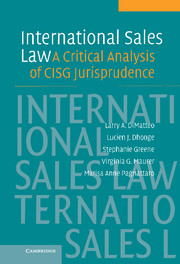Book contents
- Frontmatter
- Contents
- Preface
- Acknowledgments
- 1 INTRODUCTION
- 2 CISG METHODOLOGY AND JURISPRUDENCE
- 3 FORMATION: WRITING REQUIREMENTS
- 4 FORMATION: OFFER AND ACCEPTANCE RULES
- 5 OBLIGATIONS OF BUYERS
- 6 OBLIGATIONS OF SELLERS
- 7 COMMON OBLIGATIONS OF BUYERS AND SELLERS
- 8 BREACH OF CONTRACT BY SELLER
- 9 BREACH OF CONTRACT BY BUYER
- 10 DAMAGES, EXCUSE, AND PRESERVATION
- 11 SUMMARY AND OBSERVATIONS
- TABLE OF AUTHORITIES AND CASES
- APPENDIX A: UNITED NATIONS CONVENTION ON CONTRACTS FOR THE INTERNATIONAL SALE OF GOODS (CISG) (APRIL 11, 1980)
- APPENDIX B: CISG: TABLE OF CONTRACTING STATES (AS OF FEBRUARY 8, 2005)
- Index
Preface
Published online by Cambridge University Press: 06 August 2009
- Frontmatter
- Contents
- Preface
- Acknowledgments
- 1 INTRODUCTION
- 2 CISG METHODOLOGY AND JURISPRUDENCE
- 3 FORMATION: WRITING REQUIREMENTS
- 4 FORMATION: OFFER AND ACCEPTANCE RULES
- 5 OBLIGATIONS OF BUYERS
- 6 OBLIGATIONS OF SELLERS
- 7 COMMON OBLIGATIONS OF BUYERS AND SELLERS
- 8 BREACH OF CONTRACT BY SELLER
- 9 BREACH OF CONTRACT BY BUYER
- 10 DAMAGES, EXCUSE, AND PRESERVATION
- 11 SUMMARY AND OBSERVATIONS
- TABLE OF AUTHORITIES AND CASES
- APPENDIX A: UNITED NATIONS CONVENTION ON CONTRACTS FOR THE INTERNATIONAL SALE OF GOODS (CISG) (APRIL 11, 1980)
- APPENDIX B: CISG: TABLE OF CONTRACTING STATES (AS OF FEBRUARY 8, 2005)
- Index
Summary
This book is the product of extended research by five scholars working in the area of private international law. It provides a comprehensive review and analysis of the jurisprudence surrounding the United Nations Convention on Contracts for the International Sale of Goods (CISG). As of February 8, 2005, sixty-four countries have adopted the CISG as their international sales law. Given its importance as the world's preeminent sales law, the authors believe that a fresh analysis of the evolving case and arbitral law is needed. It has been fifteen years since the CISG, went into effect on January 1, 1988, and in those years a critical mass of interpretive jurisprudence has developed. The analysis in the book is undertaken at two levels – the practical interpretation of the CISG and the theoretical limits of interpretation of supranational conventions.
Critics have argued that the benefits of uniform international business law are minimal and that national courts will inevitably be the conscious or subconscious victims of homeward trend or domestic gloss analysis. In responding to this criticism, the authors address the following four questions:
How has the CISG in fact been interpreted and applied by the various national courts?
Is there evidence of convergence or divergence among the national courts in interpreting the CISG?
Is the current level of disharmony associated with divergent national interpretations acceptable from the perspective of the CISG's mandate of uniformity?
How does divergence in national interpretations impact the effectiveness or functionality of the CISG?
- Type
- Chapter
- Information
- International Sales LawA Critical Analysis of CISG Jurisprudence, pp. xi - xiiPublisher: Cambridge University PressPrint publication year: 2005



